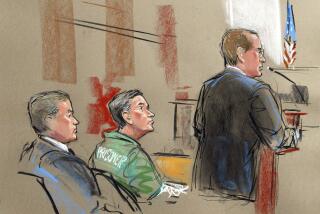Engineer Gets Life Term in Bid to Sell ‘Stealth’ Secrets
- Share via
Describing the crime as “the most grievous one can commit,” a Los Angeles federal court judge Thursday sentenced Thomas Patrick Cavanagh, the Northrop Corp. aerospace engineer who tried to sell secrets of the U.S. “stealth” bomber program to the Soviets, to life in prison.
In imposing sentence, U.S. District Judge Matthew Byrne Jr., said, “One has to ask, Mr. Cavanagh, why in the world did you do it?”
“Greed” was the answer offered by the prosecutor, Assistant U.S. Atty. Percy Anderson, who told Byrne that Cavanagh was “literally willing to sell his country out on the installment plan.”
Anderson said that after initially offering undercover FBI agents posing as Soviet operatives “stealth” documents for a single payment of $25,000, Cavanagh later tried to negotiate monthly payments of up to $30,000 for further deliveries of secret data.
“Frankly, Mr. Cavanagh is a traitor,” Anderson said. “I know that is a harsh description, but I think it is an accurate one.”
The prosecutor urged a 99-year sentence for Cavanagh, who pleaded guilty March 13 to two counts of espionage.
Defense attorney Manuel Araujo had a different answer for Cavanagh’s motivation, saying that his client’s acts were done “out of desperation to get out from under debts” and that Cavanagh did not intend to carry on with a spy operation for the Soviet Union.
Araujo asked Byrne to impose a 10-year sentence, “which is a considerable amount of time to a man who is 40 years old, but would allow him to still rebuild his life.”
“We will never know for sure if Mr. Cavanagh intended to terminate his relationship with those he thought were Soviet agents,” Byrne said. “But I don’t think there is any question the documents he was offering were highly significant, and that the disclosure of them could do significant damage to the United States (because) they related to one of this country’s most significant military projects.
Byrne made it clear that a major purpose of his stiff sentence was to provide “a deterrent to others who have the ability and capacity to commit these types of offenses.”
Just before the sentencing, Cavanagh made a brief statement to the judge, throwing himself on the mercy of the court and apologizing for betraying “the country that I love, my fellow Americans, the company I enjoyed working for and the people I worked with by my desperate and disgraceful actions.”
“I pray that the first 40 years of my life count for something,” he added.
Slumps in Chair
Cavanagh slumped down in his chair when he heard the sentence.
Araujo later told reporters: “He (Cavanagh) couldn’t believe it. He asked me twice, ‘Did I really get life?’ He was just shocked. We had hoped for 25 years at the worst.”
An engineer at Northrop’s Pico Rivera facility, Cavanagh was arrested Dec. 18, 1984, after contacting the Soviet Consulate in San Francisco and the Soviet Embassy in Washington in an effort to sell documents containing information about the “stealth” bomber program, which is designed to make U.S. planes invisible to enemy radar systems.
He was ultimately foiled by the FBI’s highly secret “contact program,” which operates sweeping physical and electronic surveillance of Soviet diplomatic facilities.
Caught by Wiretaps
Sources in the FBI told The Times that Cavanagh first came to the agency’s attention when his voice was recorded by wiretaps as he repeatedly tried to set up a contact with the Soviets to offer them information on the secret radar technology.
Although the Soviets did not respond to Cavanagh’s contacts, the FBI did. Undercover agents set up the first of three meetings with him on Dec. 10 at the Cockatoo Inn in Hawthorne. Eight days later, Cavanagh was arrested after accepting a $25,000 payment from the agents he thought were Soviets.
Even though Cavanagh was thwarted by the FBI, prosecutor Anderson said during Thursday’s court proceedings, “Some damage was done. In trying to attract the Soviets’ attention, he sent them a booklet which gave them information about ‘stealth’ that they could not otherwise have obtained.”
More to Read
Inside the business of entertainment
The Wide Shot brings you news, analysis and insights on everything from streaming wars to production — and what it all means for the future.
You may occasionally receive promotional content from the Los Angeles Times.










